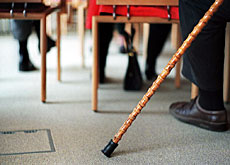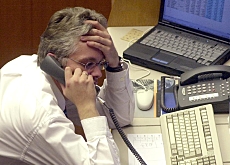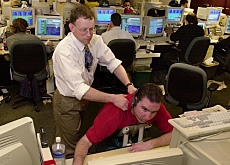Stress of modern living takes its toll

Psychosomatic illnesses are on the rise in Switzerland as people struggle to cope with the stresses and strains of everyday life.
An expert speaking at a lecture to mark Bern’s Brain Week said there had been a rise in chronic fatigue and pain-related conditions and that invalidity benefit had more claimants than ever.
The word psychosomatic is formed from the Greek words psyche (breath, life, soul) and soma (body), explained Roland von Känel, professor of psychosomatic medicine at the Inselspital psychosomatic clinic in the Swiss capital, Bern.
It is used to characterise a physical condition that has some of its roots in psychological factors such as stress or emotions. Illnesses can include childhood asthma, stomach complaints and heart problems.
“There is more stress in society, which increases psychosomatic diseases – we see that with the disability benefit numbers and we have more patients than back in the 1970s and 1980s,” von Känel told swissinfo.
He said the number of those claiming invalidity benefit rose from 3.2 per cent to five per cent between 1990 and 2003.
“Eighty per cent of those who received invalidity benefit in 2002 had no medically explained disease in the traditional biomedical sense,” he added.
Alarmed by the rise in the number of benefit claimants and spiralling costs, parliament has begun a major debate on reforming the scheme. It is aiming to reduce the number of new claimants by 20 per cent.
Family doctors are also recording an increase of psychosomatic cases, with a reported 50 per cent of patients turning up with symptoms with no physical cause. Although most had recovered 15 months later, 25 per cent said they still felt ill.
Chronic stress
Von Känel says the difference nowadays is that people are more exposed to constant stress. Our ancestors reacted to an acute stress situation – such as an attack – by using the “flight or fight” response, with the body preparing itself accordingly.
“Physiology, genes and evolution have helped us to deal with acute stress but now we have more chronic stress and our organisms and our psyche are not trained to deal with this,” he said.
Chronic stress can be explained by the faster pace of society and by other factors such as social isolation and lack of support after families break down.
Von Känel says the greatest rise in psychosomatic cases over the years has been in patients with chronic pain and fatigue.
Migrants, especially those from the former Yugoslavia, are also represented in the statistics, with many finding that former traumas reveal themselves through stress symptoms later on in life.
More recognition
The good news, says von Känel, is that even if there is not much to be done about the rise of stress, psychosomatic medicine is becoming more recognised within Switzerland.
A special two-year certificate in psychosomatic medicine was started in Switzerland six years ago. There are now 1,000 qualified practitioners belonging to the Swiss Academy for Psychosomatic and Psychosocial Medicine.
However, the discipline still lags behind countries such as the United States, which has had its own academy for almost 70 years.
It also faces some opposition from within the Swiss and German medical professions, with some still seeing it as a branch of psychiatry rather than an umbrella bio-psycho-social discipline covering many areas of medicine.
Another problem is that psychosomatic conditions are often difficult to diagnose, leading to some family doctors but also medical specialists missing them or leaving illnesses to become chronic.
Von Känel says it is also important to raise awareness of psychosomatic medicine among the population.
“A lot of people fear coming to psychosomatic clinic, because they think they’re mentally ill or that it’s all in their mind,” he told swissinfo.
“But it’s not all in their mind, it’s actually in their brain and this knowledge helps them a lot.”
swissinfo, Isobel Leybold-Johnson
In a recent survey, more than a third of Swiss workers said they were either stressed or very stressed, with young people among the most affected.
Swiss and the Swedish workers topped a 2005 international survey on workplace stress at 33%. The Dutch were the least stressed (16%).
Professor von Känel gave a lecture on the modern understanding of psychosomatic medicine as part of events marking International Brain Week in Bern.
Bern’s Brain Week runs March 18-24, with a series of evening lectures and an open day at a rehabilitation clinic.
International Brain Week was March 13-19, but events have been held around Switzerland all month. Basel will hold its week March 27-31.

In compliance with the JTI standards
More: SWI swissinfo.ch certified by the Journalism Trust Initiative




You can find an overview of ongoing debates with our journalists here. Please join us!
If you want to start a conversation about a topic raised in this article or want to report factual errors, email us at english@swissinfo.ch.